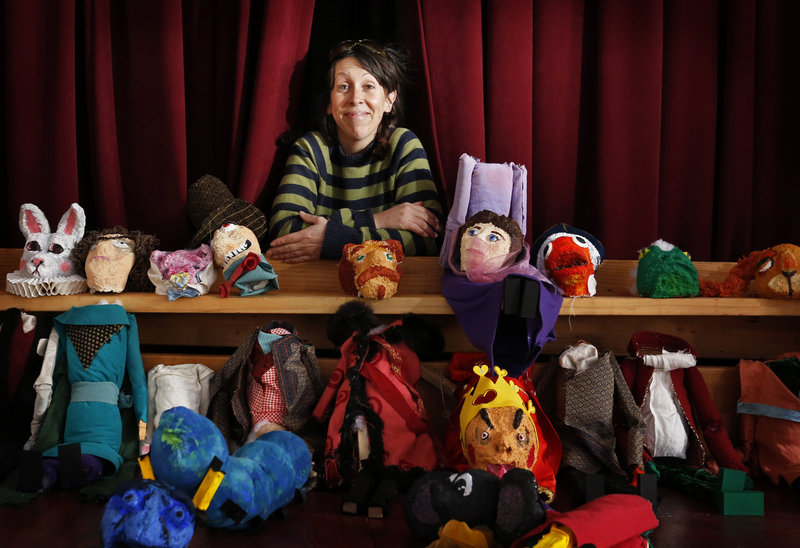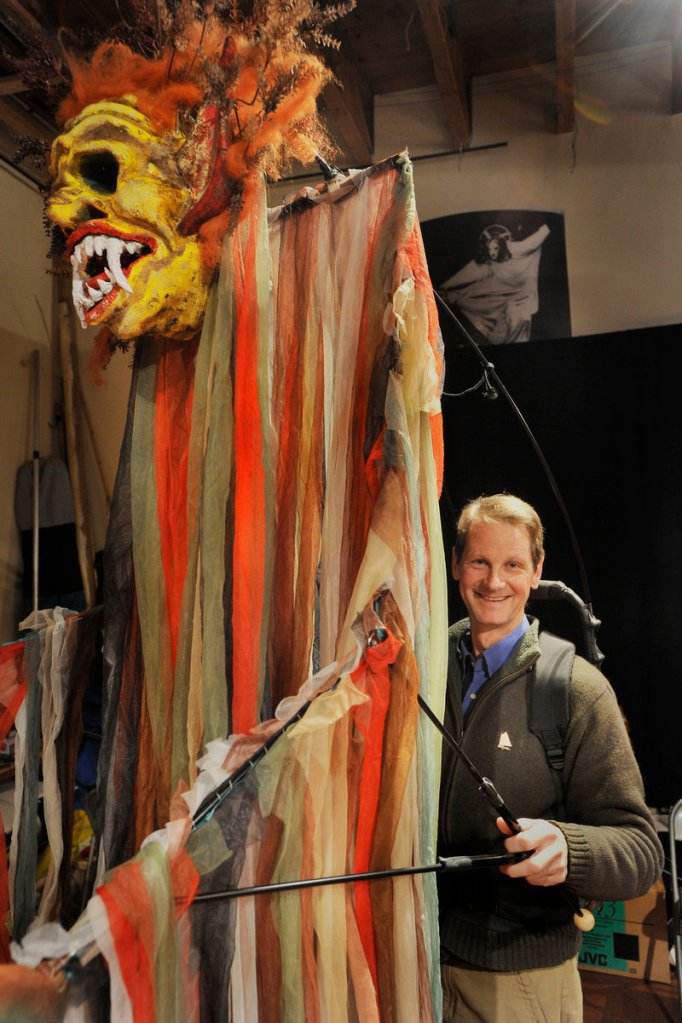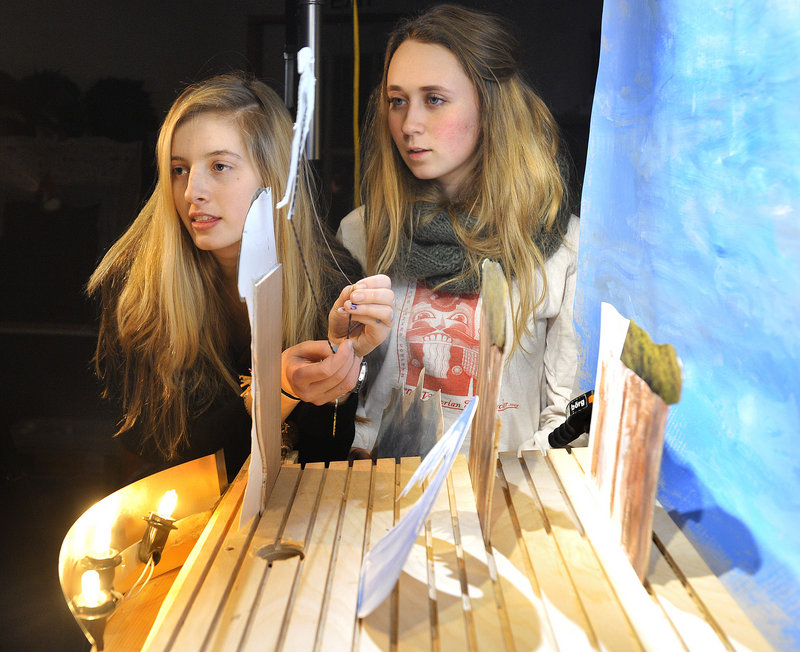Blainor McGough is often surrounded by puppets. But it’s not always like a scene out of “Sesame Street” or “The Muppet Show.”
McGough, 38, runs a nonprofit business called Mayo Street Arts, a three-year-old performance center in a refurbished Portland church. Lately, Mayo Street has become the center of the Portland area’s large, vibrant and not necessarily kid-friendly puppet theater scene.
It’s a scene that includes adult-themed “puppet slams,” puppet operas, puppet versions of Charles Dickens stories — even puppets acting out Homer’s epic poem “The Odyssey.”
And it’s a scene that has attracted national attention, including a visit to Mayo Street Arts in 2011 by Heather Henson, a leading puppetry promoter and daughter of the late Jim Henson, the Muppets creator. A group that Henson started, the Puppet Slam Network, even gave Mayo Street a $2,000 “slam grant” last year.
“Oh, I love what they’ve done with the slams at Mayo Street,” said Marsian De Lellis, the Los Angeles-based coordinator of the Puppet Slam Network. “There aren’t many places in the Northeast that small doing slams like that.”
But it’s not just slams, which consist of a variety of short-form plays for adults that use (and sometimes abuse) puppets as part of the drama. Greater Portland is quickly becoming puppet central. Besides the happenings at Mayo Street, the local puppet scene includes:
• The Improvised Puppet Project, which in February will begin staging monthly performances at Acorn Studios in Westbrook, and is planning a summer performance called “The Post Apocalyptic Improvised Zombie Puppet Musical.”
• Figures of Speech Theatre in Freeport, where members of the puppet theater’s student ensemble are making a film version of “Frankenstein” using small paper puppets.
• Peaks Island Puppets, which is working on a piece called “The Rudder Family Holiday Planner: A Guide to the New Jewish.”
• Alex Endy, a frequent puppet slam participant at Mayo Street, who teaches morning puppet workshops at Portland’s East End Community School.
• Several groups, including Mayo Street, Portland’s Shoestring Theater and students from Maine College of Art, that are collaborating on a production of “Alice in Wonderland” using Sicilian marionettes for the Portland Performing Arts Festival in June.
So what do all these puppet happenings — as well as the attention they’ve garnered from Henson — tell us?
For one, that Portland has an incredibly vibrant and large puppet scene for a relatively small city.
Second, that puppets as entertainment can be a lot more than what Howdy Doody or Kermit the Frog had previously led many of us to believe.
“There is a renaissance in puppetry right now, and I do think there’s more going on in Portland than in a lot of places,” said Libby Marcus, a longtime puppeteer and puppet maker who was based in Boston for years before moving to Portland in 1999, when her husband got a job at Bowdoin College in Brunswick. “I’ve certainly seen an increase in (puppeteers) since I’ve been here.”
MAYO STREET PROVIDES A BASE
Why Portland has gained such a potpourri of puppetry is hard to say.
Many local puppeteers say it’s at least partly because Maine continually attracts creative, artistic people. So an offshoot of that is a lively puppet scene.
But people also say that while Portland has always had a puppet scene — both Shoestring and Figures of Speech Theatre are puppet theater companies that have been around for some 30 years — it has become so much more visible since Mayo Street opened in 2009 and gave puppeteers a concrete place to practice their art.
“Puppetry has always been a sort of underground, back-room type of art form,” said Nance Parker, who has run Shoestring Theater while holding down a variety of day jobs since 1982. “But now Mayo Street gives everyone in the puppet community a place to come.”
Mayo Street’s McGough grew up in Portland and fell in love with puppetry while doing an internship with Parker as a college student.
She opened Mayo Street as a nonprofit arts center with her partner, Brian Arlet, and it hosts events beyond puppetry.
But largely because of McGough’s background, the place has become the hub of puppet activity in Maine.
“I saw puppetry as this anti-technology activity that allows you to be so creative,” said McGough. “I just knew I wanted to do it.”
The most recent puppet slam at Mayo Street was a November production called “King Friday’s Dungeon.” It featured King Friday from “Mister Rogers’ Neighborhood” transformed into a foul-mouthed old coot, as well as other acts.
Last year, Mayo Street also hosted puppet versions of Homer’s “The Odyssey” and Charles Dickens’ “A Christmas Carol” — both put on by Shoestring Theater — as well as a puppet version of the opera “Hansel and Gretel” by Paper Bull Puppets.
MUPPET GENERATION
Some local puppeteers, especially those who are now in their 20s or 30s, say the Muppets and “Sesame Street” had a huge impact in terms of turning them on to puppetry, even if the puppetry they do now isn’t just for children.
“That can’t be underestimated,” said Endy, 36, of Portland. “Puppets are really object theater, the idea of using anything other than human actors to tell a story. So that means puppetry can be extremely diverse.”
Portland’s scene includes lots of different kinds of puppets, such as the tiny paper puppets being used in the “Frankenstein” movie, Sicilian marionettes, simple cloth puppets, rod-activated puppets and giant papier-mache heads and masks.
For Paper Bull Puppets’ “Hansel and Gretel” opera, the puppetry was in the Japanese Bunraku style. That means the puppets were roughly the size of children, operated by three people each, who are seen on stage. One of the operators also had to be a skilled opera singer.
Although puppet scenes like the one existing in Portland aren’t rare in the United States, they’re often found in larger cities such as New York or San Francisco.
Tara McDonough grew up in Maine, but was doing theater in San Francisco when she discovered her passion for performing with puppets. She became part of a troupe that did unscripted shows with hand and rod puppets.
“Puppets allow me to play characters I can’t play as a person. And you can get away with things with a puppet, because they have a likability that allows you to push the audience’s trust,” said McDonough, 42.
When she moved back to Maine after 15 years away, McDonough began doing theater productions and found other folks interested in unscripted puppet shows.
Thus was born the Improvised Puppet Project. The puppeteers in the group don’t follow a script, they use their puppets to improvise a performance. They base their performances on suggestions from the audience.
McDonough said that once she started talking to other local folks about puppets, she began to realize the puppet scene was bigger here than she thought.
Puppeteers in Portland are sort of a sub-genre of the larger arts community. But like most artists here, few, if any, make a full-time living doing what they love.
Parker works as a teacher and is a painter, McDonough does marketing work for the Portland Symphony Orchestra, and Endy, besides teaching at East End School, works for the city’s public facilities division helping to set up concerts and events.
Two people who did make a living in puppetry for years are John and Carol Farrell, founders of Figures of Speech Theatre in Freeport. Their theater company performed around the world for years, with both of them working full time in the company.
But in recent years, the economy has affected their work — particularly their paid work in schools — and Carol Farrell recently took a job at Bates College in Lewiston.
Marcus has made money by making puppets and masks for theater productions, especially in Boston. And like McGough and other puppeteers, she looks for grants when she can find them.
With help from a grant from Puppeteers of America, she’s working on a production based on the work of Samuel Beckett using marionettes, rights pending.
Marcus points out that because of the relatively small population base in Portland compared with New York or Boston, it’s hard to say how sustainable the puppet scene here is, both in terms of audience demand and how puppeteers make a living.
But for now, the people involved in the performing art remain passionate and energized to continue the work they love.
“I feel very lucky to be able to do this, and to see so many people younger than me really excited and knowledgeable about puppets,” said Endy. “Portland seems to be disproportionately blessed. We don’t have every kind of (arts) scene, but if we do have one, it’s really, really good. And I think it’s that way with puppets.”
Staff Writer Ray Routhier can be contacted at 791-6454 or at:
rrouthier@pressherald.com
Send questions/comments to the editors.







